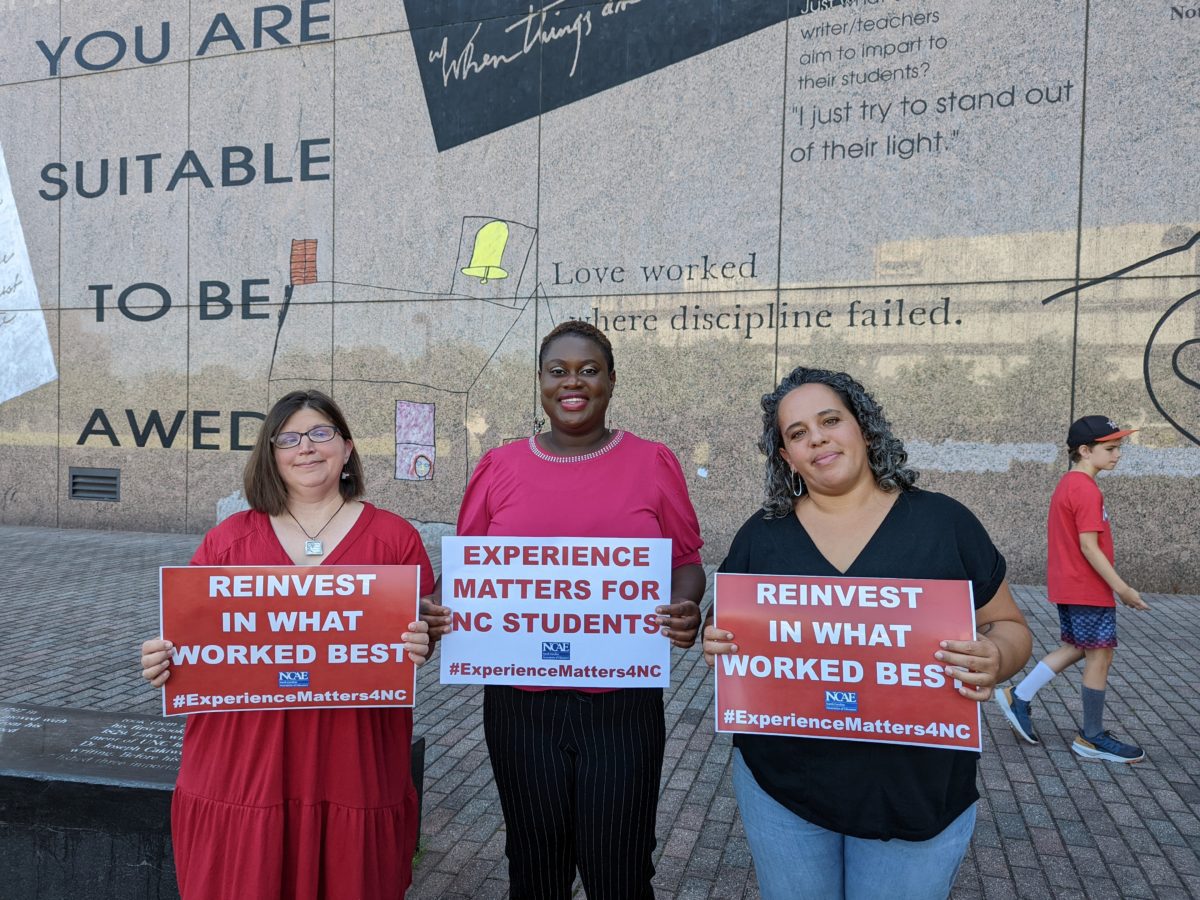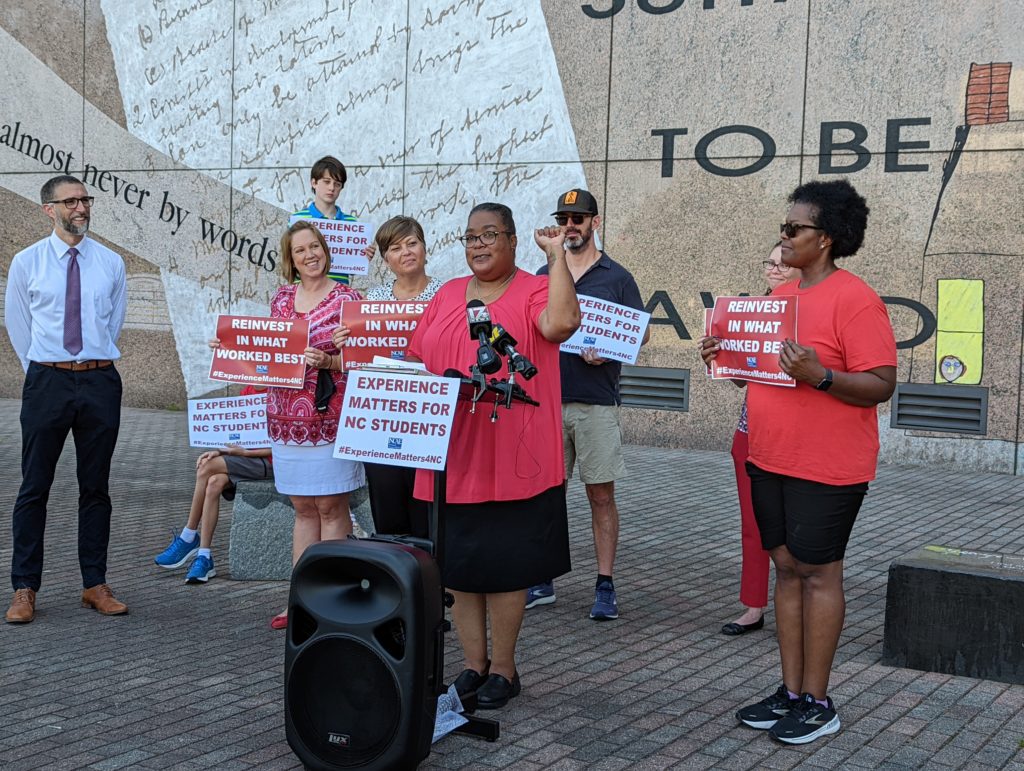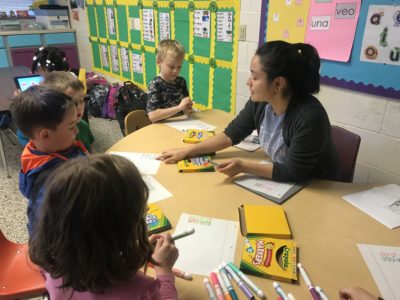
|
|
As the Professional Educator Preparation and Standards Commission (PEPSC) prepares to vote on a plan to change how teacher licensure and compensation works, the subcommittees are responding to feedback received from teachers and other stakeholders.
The “tentative plan” is for PEPSC to approve the draft in September or October before it eventually goes to the State Board of Education and then the state legislature for approval.
Sign up for the EdWeekly, a Friday roundup of the most important education news of the week.
Going forward, the commission will have new leadership. Longtime chair Patrick Miller’s term ends at the end of August. Miller has chaired the commission ever since its inception in 2017. When he steps down, Van Dempsey will become the new chair.
Dempsey is the dean of the Watson College of Education at UNC-Wilmington and has also served on PEPSC since it began. At PEPSC’s meeting this week, he thanked Miller for his leadership.
“I also want to tell members of the commission that it’s an honor, it’s humbling to be stepping into this role, particularly to follow our first chair,” he said. “I have tremendous respect for the work that PEPSC does, but also the people on this commission who do this work.”
What are people saying about the plan?
As the plan, which is still a draft at this point, has moved through PEPSC subcommittees, it has drawn many questions and concerns, particularly from teachers. In recent months, teacher Justin Parmenter has uncovered public records that highlight the need for an open and transparent process.
In May and June, the nonpartisan Public School Forum of North Carolina conducted a series of focus groups with teachers, educator preparation programs (EPPs), and school and district leaders about the plan. The resulting brief found that participants had a lot of things they liked and didn’t like about the plan, but even more questions about implementation.
Here’s what participants liked:
- Multiple opportunities for growth and career advancement
- Alternative entry points and pathways, specifically the opportunity for teacher assistants to become teachers while working in the school
- Potential for higher compensation and starting salary
- Access to professional advancement funds
- Opportunities for co-teaching and mentorships
And their concerns:
- Complexity
- Human capacity and fiscal resources required for implementation, particularly for low-wealth districts
- Lack of clarity and issues with the evaluation process
- Compensation and recruitment (still not enough and too complex)
- Lack of license IV educator/advanced teacher roles needed for the mentorship aspect of the model to work
- Ability to pay for locally funded positions
- Potential equity concerns, such as a lack of incentive to work with higher-need students
- Potential to create competition among educators, particularly for advanced positions
- Lack of clear role for EPPs
- Pressure on schools and principals to support or drive the process
As recently as this week, the North Carolina Association of Educators (NCAE) spoke out against the plan.
“The truth of it is, we already know what will work to recruit and retain more high quality educators,” NCAE Vice President Bryan Proffitt said at a press conference on Tuesday.

He said the legislature should instead put more resources into schools of education, hire back teaching assistants, and encourage residency and grow-your-own programs — and pay teachers more from the start.
Some of their biggest concerns with the proposal are how teacher effectiveness will be determined, especially if test scores will be included. They’re also concerned that changing the salary schedule and only giving teachers raises when their licenses are renewed every five years will push more to leave the profession.
“We deserve to be paid for our experience without jumping through hoops or worrying if this year’s paycheck will be different than next year’s,” Kiana Espinoza, an English as a Second Language (ESL) teacher in Wake County, said.
The North Carolina Association of Colleges for Teacher Education (NCACTE) also came out with a statement this week expressing continued concerns about the plan.
“It is not our intention to derail this project, but rather, to create a model that can work and has the support of all stakeholder groups,” the statement reads. “If the intention of the proposal is to incentivize EPP completion as the first, best path for teacher preparation, then that proposal should clearly and forcefully reflect that. NCACTE and its members wholeheartedly support a model that can reduce barriers for becoming teachers, produce high-quality teachers for all children, and compensate teachers for the hard work they do.”
Read the full statement and the recommendations below.
Responding to feedback
The subcommittees have continually discussed and responded to feedback during this process.
The four subcommittees — preparation and entry, licensure, advancement and development, and budget and compensation — are doing the bulk of the work on the proposal, and then the chairs bring the work to the full commission. There were two meetings this week: one with the chairs of the four subcommittees and commission leadership, and then a full meeting of the commission.
Much of the discussion this week focused on two concerns: pay and effectiveness measures.
Aaron Fleming, co-chair of the Budget and Compensation subcommittee, said they are looking at giving teachers annual salary increases between 0.5% and 1.5% instead of $5,000 every five years.
“We’re trying to figure out what is a lofty goal but not one that is so far away that it would be nearly impossible to have,” he said.
He also clarified that the draft will include a hold harmless for teachers currently licensed, meaning they would not receive a pay cut under this new plan. Though he doesn’t think any teachers would receive one, he added.
Former teacher of the year and commission member Maureen Stover is working on a new infographic to better explain the licensure pathways in response to feedback.
“This infographic was designed and created based on the feedback that we were getting from teachers on that green infographic,” Stover said. “So this one is North Carolina-created by two teachers with the input of lots and lots of teachers who said, ‘Hey this is going to work a lot better.’”
Stover, the state’s 2020 teacher of the year, went on to say it’s important that the commission is “honoring and respecting the feedback that we’ve gotten from teachers.”
The commission also wants to make sure they know what effectiveness measures will be part of the plan and to make sure they have the right ones in place.
Dempsey said he worries that if PEPSC ties itself to language that was used in the initial presentation to the State Board of Education that wasn’t actually proposed by the commission, the public will get the idea that the plan is already predetermined.
He proposed moving away from that language and acronyms that carry specificity “because those things have actually not been determined. It has been determined that we need evidence of impact on student learning and we need evidence that comes from peer and collegial review of practice.”
The full presentation from the co-chairs meeting is below.
What’s next?
The subcommittees will work with staff from the Department of Public Instruction to finalize the plan before it is officially brought to the full commission.
In addition to a new chair, PEPSC also has several new members who will be joining at the end of the month.
Lauren Genesky, a Raleigh teacher; Westley Wood, executive director of personnel and human resources at Wilkes County Schools; and Eugenia Floyd, 2021 Burroughs Welcome Fund North Carolina Teacher of the Year, will be ending their service along with Patrick Miller at the end of August.
They will be replaced by Scott Elliott, superintendent of Watauga County Schools; Madison Edwards, a teacher in Randolph County Schools; Leah Carper, 2022 Burroughs Welcome Fund North Carolina Teacher of the Year; and Bill Griffin, assistant superintendent for human resources at Caldwell County Schools.
PEPSC subcommittees are continuing to meet this month before the next full meeting in September. Anyone with ongoing questions or concerns about the licensure and compensation plan, please email pathways.feedback@dpi.nc.gov.
Editor’s Note: Patrick Miller is the chair of EdNC.
Recommended reading




